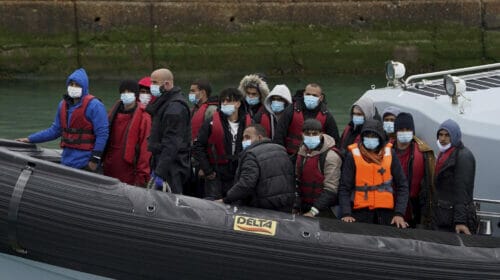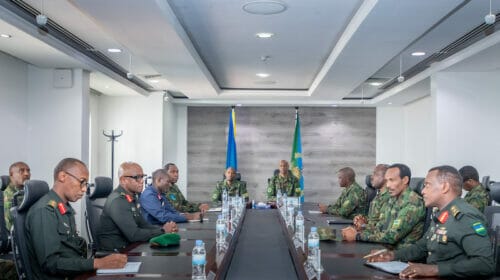Elections are too important for Rwandan government to leave to the whims of voters
By Kris Berwouts
 With three quarters of the votes counted, the Rwandan Patriotic Front (RPF) is heading for an overwhelming victory in the legislative elections. The RPF has mobilised 76% of the voters, against 13 and 9.4 percent respectively for the Social Democratic Party and Liberal Party. These results deserve our respect and congratulations – perhaps not for their democratic quality, but for the event itself – impressive and perfectly directed as a mass scene in a better-than-average bible movie.
With three quarters of the votes counted, the Rwandan Patriotic Front (RPF) is heading for an overwhelming victory in the legislative elections. The RPF has mobilised 76% of the voters, against 13 and 9.4 percent respectively for the Social Democratic Party and Liberal Party. These results deserve our respect and congratulations – perhaps not for their democratic quality, but for the event itself – impressive and perfectly directed as a mass scene in a better-than-average bible movie.
Virtually a single-party state …
The Rwandan Patriotic Front that has ruled the country since the end of the civil war and genocide in July 1994. It dominates the political landscape to the extent that the country almost functions as a single-party state. Over the years, the RPF has built up its control over most aspects of public life, including the legislative, executive and judicial institutions. The independent press ceased to exist many years ago, the RPF defines what is politically admissible and public opinion is managed by an effective mixture of repression, social pressure and self-censorship.
The country is unaccustomed to open political debate. The party’s grip on society is so firm that elections have become an almost meaningless event and are so predictable that they thrill absolutely nobody. But they are important for the regime. Elections are far too important for the Rwandan government to leave them to the whims of voters.
…with some other parties
Since the end of the genocide, the RPF has maintained relationships with a number of parties that are part of the political scene, but have little ambition to break the RPF’s hegemony or initiate a controversial public debate. They use the limited political space allowed by the regime and are considered by Rwandan and international observers as satellite parties whose main reason for existence is to create the illusion that Rwanda has a political system of active multiparty competition. In return, they ephemerally participate in managing the country, with some MPs and ministers.
Rwanda does have a number of genuine opposition parties who do not believe that the RPF represents all Rwandans and want to question the current regime’s policies and to build up a counter-power through conventional political means. These parties face several difficulties when trying to deploy normal political activities. Firstly, they have trouble getting registered as parties and, once they are, they frequently don’t get authorization for their meetings. Their leaders and supporters are physically and verbally harassed, and their candidates prosecuted.
Another strategy for neutralizing a political party which tries to challenge the regime is to divide it. This recently happened with Bernard Ntaganda’s Parti Social – Imberakuri (PS-I) . Ntaganda was arrested and condemned, and the authorities organized a dissident group within his party and recognized the wing that decided to oppose Ntaganda and stay loyal to the regime. They participated in this week’s elections under the original name of the party – PS-I.
Irrelevant ?
These elections had very little to do with democratic political competition. People couldn’t even elect individual candidates. They voted for parties who will appoint the MPs representing the people. Most critics of the current Rwandan regime consider the results of these elections as hardly relevant because they took place in an entirely controlled political environment.
I don’t agree with that. I think the results are relevant. Of course, the elections will not reveal anything about the power balance between political parties, visions or strategies. But they were not meant to do that. They might, however, tell us something about the power balance within the RPF. Kagame’s regime has, on several occasions, been under heavy fire in recent years and this has caused a lot of internal tensions.
Partly because of these tensions, a process of generational chnage is taking place around Kagame. Younger men and women with a different profile have got high-profile functions and responsibilities: born in the late seventies or early eighties, ambitious, well-trained technocrats rather than military, polyglot intellectuals with a Singapore-shaped vision rather than the leaders who grew up in the refugee camps, fought the war against Obote and Habyarimana, eventually getting rich through the plundering of Congo. In short, the people who shaped Kagame’s Brave New World were replaced by the people who grew up in it.
This process has created many conflicting interests. If the power of Kagame in Rwanda today is threatened, then it is not by the political opposition and even less by the armed combatants of the FDLR. It is threatened by its own lack of coherence and the discontent in its inner circle.
That is why I am looking forward to the results of the elections. Not to see the scores that the individual parties achieve, but to view the names and profiles of the new MPs. I will try to analyse them against the backdrop of generational change and the divisions within the RPF. If these elections tell us anything at all, they might give us some indication of where this regime is going to and how it is trying to reposition itself.
Kris Berwouts has, over the last 25 years, worked for a number of different Belgian and international NGOs focused on building peace, reconciliation, security and democratic processes. Until recently, he was the Director of EurAc, the network of European NGOs working for advocacy on Central Africa. He now works as an independent expert on Central Africa.
Source: africanarguments.org


